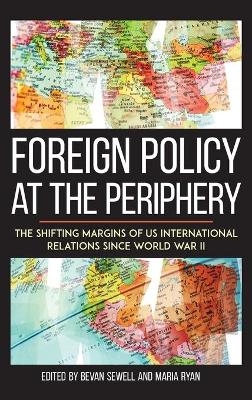
Foreign Policy at the Periphery
The University Press of Kentucky (Verlag)
978-0-8131-6847-0 (ISBN)
- Keine Verlagsinformationen verfügbar
- Artikel merken
As American interests assumed global proportions after 1945, policy makers were faced with the challenge of prioritizing various regions and determining the extent to which the United States was prepared to defend and support them. Superpowers and developing nations soon became inextricably linked and decolonizing states such as Vietnam, India, and Egypt assumed a central role in the ideological struggle between the United States and the Soviet Union. As the twentieth century came to an end, many of the challenges of the Cold War became even more complex as the Soviet Union collapsed and new threats arose.
Featuring original essays by leading scholars, Foreign Policy at the Periphery examines relationships among new nations and the United States from the end of the Second World War through the global war on terror. Rather than reassessing familiar flashpoints of US foreign policy, the contributors explore neglected but significant developments such as the efforts of evangelical missionaries in the Congo, the 1958 stabilization agreement with Argentina, Henry Kissinger's policies toward Latin America during the 1970s, and the financing of terrorism in Libya via petrodollars. Blending new, internationalist approaches to diplomatic history with newly released archival materials, Foreign Policy at the Periphery brings together diverse strands of scholarship to address compelling issues in modern world history.
Bevan Sewell, assistant professor in American history at the University of Nottingham, UK is the author of Eisenhower, Kennedy, and US Economic Policy in Latin America and coeditor of Projecting American Foreign Policy: Power and Intervention. Maria Ryan is assistant professor in American history at the University of Nottingham, UK. She is the author of Neoconservatism and the New American Century.
Introduction How the Periphery Became the Center: The Cold War, the Third World, and the Transformation in U.S. Strategic Thinking Peripheral Vision: U.S. Modernization Efforts and the Periphery Narratives of Core and Periphery: The Cold War and After US Government Responses to Anti-Americanism at the Periphery Peripheral Places/Global War Whistling in the Dark: US Efforts to Navigate UN Policy toward Decolonization, 1945-1963 One World? Rethinking America's Margins, 1935-1945 Accidental Diplomats: The influence of American Evangelical Missionaries on Early US-Congolese Cold War Relations, 1945-1963 Structuring the Economy on the Periphery: The United States, the 1958 Argentine Stabilization Agreement, and the Evolution of Global Capitalism Uncertainty Rising: Oil Power and "International Terrorism" in the 1970s Libyan Petrodollars, the Financing of Terrorism, and U.S. Foreign Policy, 1969-1981 The Peripheral Centre: Nicaragua in US Policy and Imagination at the End of the Cold War Enlargement and Its Discontents: Core and Periphery in Clinton-Era Foreign Policy The 'War on Terror' and the New Periphery
| Erscheinungsdatum | 18.01.2017 |
|---|---|
| Reihe/Serie | Studies in Conflict, Diplomacy, and Peace |
| Mitarbeit |
Sonstige Mitarbeit: Robert J. McMahon, David Ekbladh, Andrew Rotter |
| Verlagsort | Lexington |
| Sprache | englisch |
| Maße | 152 x 229 mm |
| Themenwelt | Geschichte ► Allgemeine Geschichte ► Zeitgeschichte |
| Geisteswissenschaften ► Geschichte ► Regional- / Ländergeschichte | |
| Sozialwissenschaften ► Politik / Verwaltung ► Europäische / Internationale Politik | |
| Sozialwissenschaften ► Politik / Verwaltung ► Politische Systeme | |
| Sozialwissenschaften ► Politik / Verwaltung ► Politische Theorie | |
| ISBN-10 | 0-8131-6847-3 / 0813168473 |
| ISBN-13 | 978-0-8131-6847-0 / 9780813168470 |
| Zustand | Neuware |
| Haben Sie eine Frage zum Produkt? |
aus dem Bereich


